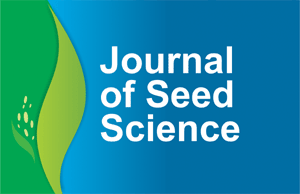Abstract:
The productivity of the oilseed rape crop is responsive to the application of nitrogen (N) and the effect of N is sulfur (S)-dependent. In addition, storage may influence seed vigor. The aim of the present study was to assess the effect of fertilization with nitrogen and sulfur on the physiological quality of rapeseeds. All combinations of four doses of N (0, 40, 80, and 120 kg.ha-1) and five of S (0, 30, 60, 90, and 120 kg.ha-1) were evaluated with four replications each distributed in a randomized block design in a distroferric Red Latosol soil. The effects of the nutrients and their combinations on the physiological potential of rapeseeds were evaluated even immediately after harvest and 180 days of storage through the germination test, accelerated aging, field emergence and seedling performance. The application of N associated with S had a positive effect on the physiological quality of the seeds. The application of the 120 kg.ha-1 dose of N and the 80 kg.ha-1 dose of S promoted the highest germination and vigor of the seeds. Seed storage for a period of 180 days led to a drastic reduction in the physiological potential of the rapeseeds.
Index terms:
Brassica napus; crop technology; seed vigor; storage

 Thumbnail
Thumbnail
 Thumbnail
Thumbnail
 Thumbnail
Thumbnail
 Thumbnail
Thumbnail
 Thumbnail
Thumbnail
 Thumbnail
Thumbnail





